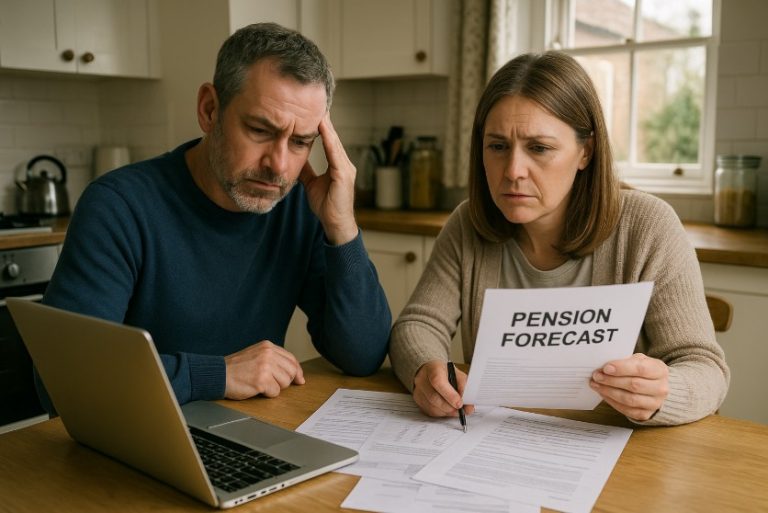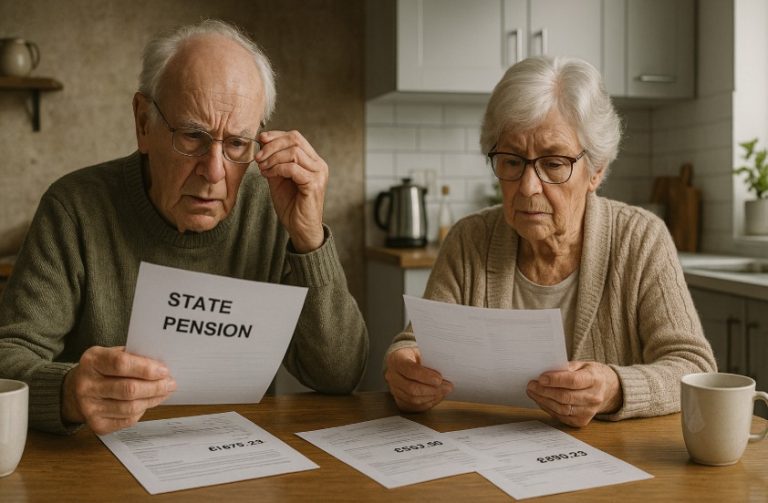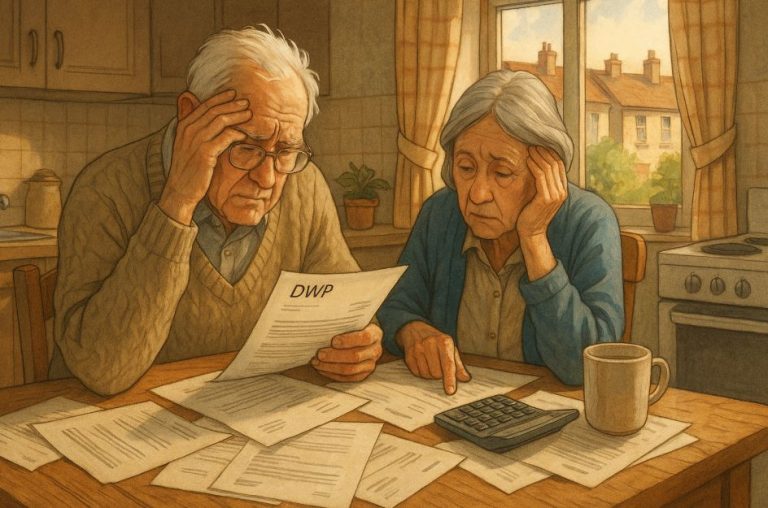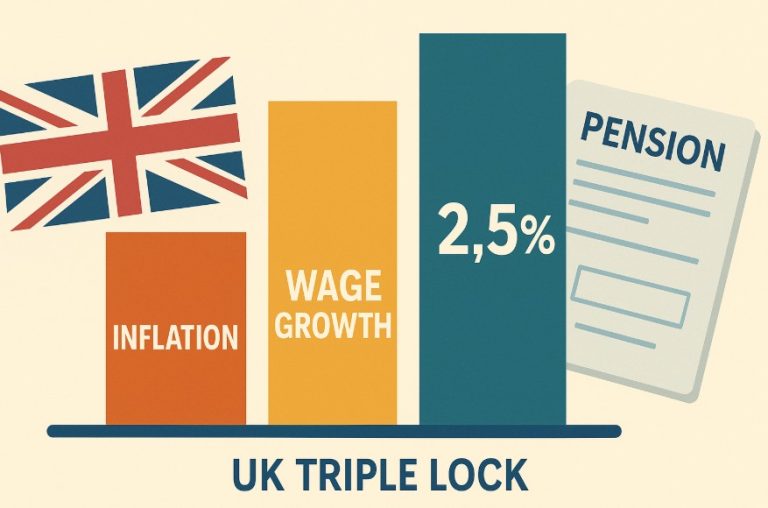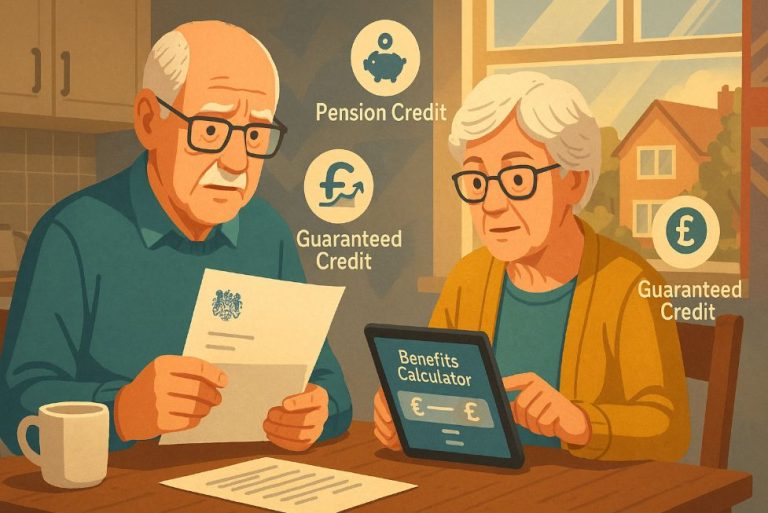For many UK pensioners, the tax treatment of savings interest can feel complicated. When additional income comes from pensions, savings accounts, or investments, it is not unusual for HM Revenue & Customs (HMRC) to issue a notice regarding unpaid or incorrectly calculated tax.
These are known as HMRC savings notices. Understanding why they are sent and what action to take is essential for avoiding penalties and keeping tax affairs in order.
What Is An HMRC Savings Notice For UK Pensioners?
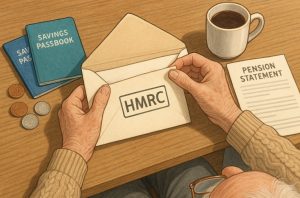
An HMRC savings notice is an official letter sent to pensioners when HM Revenue & Customs identifies that savings income, such as bank interest or investment returns, may not have been taxed correctly.
Pensioners are often affected because their income comes from a mix of pensions, savings accounts, and sometimes part-time work.
These notices are not always penalties. In many cases, they act as reminders to review income and tax records.
For pensioners, the notices highlight potential gaps between what has been reported by banks and what allowances apply.
HMRC receives annual reports from banks, building societies, and financial institutions about interest paid to individuals.
If the figures exceed allowances or differ from HMRC’s records, a notice is issued to request clarification or payment.
Why Might Pensioners Receive An HMRC Savings Notice?
Pension Income Pushing Total Earnings Above Allowances
One of the most common reasons pensioners receive savings notices is that their pension income increases their overall taxable income. Even modest pensions can reduce or eliminate eligibility for the Starting Rate for Savings.
For example, if pension income is over £17,570, the £5,000 savings rate is not available, which means interest is taxable sooner than expected.
Interest Reported Directly By Banks And Building Societies
Since banks and building societies now pay interest gross, they must report the full amount directly to HMRC. Pensioners may not realise this reporting happens automatically. If the interest exceeds allowances, HMRC uses this information to adjust tax codes or issue a savings notice.
Changes In Tax Codes Or Inaccurate Estimates
HMRC tax codes are updated annually and include estimates of savings interest based on the previous year’s figures. If savings balances or interest rates change, the estimate may be too high or too low.
Pensioners with fluctuating savings can therefore receive notices because HMRC’s estimate no longer matches actual interest.
Untaxed Interest On Joint Accounts
For pensioners with joint savings accounts, interest is usually split 50/50 between account holders by default. If the split should be different but HMRC is not informed, discrepancies occur. Notices are often issued when reported interest figures do not align with the pensioner’s actual share.
Overlooked Savings From Multiple Sources
Some pensioners hold accounts with several banks, building societies, or credit unions. When combined, the total interest may exceed allowances, even if individual accounts seem modest. HMRC notices are often triggered when total reported savings income is higher than expected.
Failure To Notify HMRC Of Income Changes
Pensioners are required to keep HMRC informed of changes to their financial situation. If additional pension income, part-time work, or investment income is not reported, HMRC’s records will be incomplete. Savings notices are issued when the missing information surfaces through bank reporting or compliance checks.
How Does HMRC Calculate Tax On Savings For Pensioners?
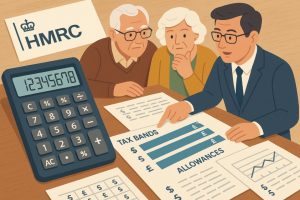
Tax on savings is calculated by looking at the total income received in a tax year. This includes state pension, workplace or private pensions, wages if applicable, and all forms of interest. The following allowances are applied:
- Personal Allowance: Standard £12,570 tax-free income. If pension income does not use the full allowance, the remainder can be applied to savings interest.
- Starting Rate for Savings: Up to £5,000 of savings interest may be tax-free, but only if other income is below £17,570. This allowance reduces by £1 for every £1 above the personal allowance threshold.
- Personal Savings Allowance (PSA): Basic rate taxpayers get £1,000, higher rate taxpayers get £500, and additional rate taxpayers receive no allowance.
This layered system means that two pensioners with similar savings could have very different tax outcomes depending on pension income levels.
What Is The Savings Income Threshold For Pensioners?
Savings thresholds determine how much interest can be earned without paying tax. Pensioners must consider their total income when applying these rules.
| Income Level | Allowance Type | Maximum Tax-Free Savings Interest |
| Income under £12,570 | Personal Allowance | £12,570 less other income |
| Income under £17,570 | Starting Rate for Savings + PSA | Up to £5,000 plus PSA |
| Basic Rate (20%) | Personal Savings Allowance | £1,000 |
| Higher Rate (40%) | Personal Savings Allowance | £500 |
| Additional Rate (45%) | None | £0 |
For example, a pensioner with £15,000 pension income can only claim part of the starting rate for savings, while someone with £10,000 pension income could benefit from the full £5,000 allowance in addition to the PSA.
How Can Pensioners Check If Their Savings Interest Is Taxed Correctly?
Reviewing HMRC Tax Codes
HMRC issues a tax code to show how much income can be received tax-free. For pensioners, this often includes adjustments for expected savings interest.
If the code is based on outdated estimates, it may cause underpayment or overpayment of tax. Checking the tax code on pension statements or PAYE coding notices is the first step to confirming accuracy.
Using The HMRC Personal Tax Account
The HMRC online Personal Tax Account allows pensioners to see what income sources are linked to their record.
This includes savings interest reported by banks and building societies. By comparing online figures with bank statements, pensioners can verify whether HMRC’s records reflect actual interest earned.
Checking Bank And Building Society Statements
Pensioners should review the annual statements provided by their banks or building societies. These show the total interest received within the tax year.
Comparing this with HMRC records helps identify discrepancies. Statements are especially useful for pensioners with multiple accounts, where interest from different sources may add up more than expected.
Completing Form R85 For Tax-Free Interest At Source
Form R85 can be submitted to a bank or building society to ensure that savings interest is paid without tax deduction if total income falls below the personal allowance.
This option is particularly useful for pensioners with modest pension income who want to avoid reclaiming tax later.
Reclaiming Overpaid Tax With Form R40
If tax has been deducted unnecessarily, pensioners can reclaim it using form R40. This is often the case when income was lower than expected or when tax-free allowances were not applied correctly.
Claims can be made for up to four years, ensuring that overpayments are not permanently lost.
Requesting A Tax Calculation From HMRC
Pensioners who are unsure about their savings income position can request a tax calculation directly from HMRC.
This document sets out how HMRC has applied allowances, interest figures, and tax rates. It provides a clear overview of whether savings interest has been taxed correctly and identifies if any adjustments are required.
What Should Pensioners Do After Receiving An HMRC Savings Notice?
When an HMRC savings notice is received, pensioners should take practical steps to resolve the matter quickly.
- Read the notice carefully and identify the savings interest amount in question.
- Check the interest figures against statements from banks or building societies.
- Compare the reported interest with allowances such as Personal Allowance, Starting Rate for Savings, and PSA.
- Contact HMRC if there are discrepancies or if income circumstances have changed.
- Complete necessary forms to reclaim overpaid tax or settle outstanding amounts.
In most cases, timely action prevents penalties and ensures that records are corrected for the following year.
How Do HMRC Letters About Untaxed Interest Affect Pensioners?
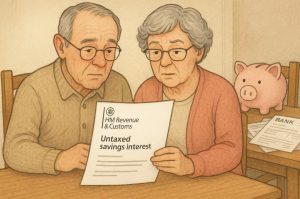
HMRC issues letters about untaxed interest when banks report savings income that has not been taxed at source.
Since April 2016, most banks pay interest gross, which means no tax is deducted before it is received.
For pensioners, this means HMRC calculates whether tax is due based on reported figures. If the total exceeds allowances, tax is collected either through a Self Assessment return or by adjusting the pensioner’s tax code.
Letters may also include an estimated calculation for the next tax year, adjusting codes to account for ongoing savings interest.
Pensioners should confirm these estimates are correct, especially if savings have been reduced or withdrawn.
Can Pensioners Claim Tax Relief On Their Savings Income?
Pensioners can benefit from tax relief if savings income falls within available allowances. Relief options include:
- Applying any unused portion of the Personal Allowance to savings interest.
- Using the Starting Rate for Savings when income is below £17,570.
- Claiming the Personal Savings Allowance based on their tax band.
- Requesting a refund of overpaid tax using form R40.
In addition, pensioners with joint accounts should ensure that interest is correctly split between account holders. If the default 50/50 split is inaccurate, HMRC must be notified to adjust the allocation.
What Are The Common Mistakes Pensioners Make With HMRC Savings Notices?
Several mistakes contribute to pensioners receiving HMRC savings notices unnecessarily. These include:
- Believing that all savings are tax-free regardless of total income.
- Forgetting to declare interest from multiple accounts or joint savings.
- Assuming HMRC’s tax code adjustments are always accurate.
- Overlooking interest earned from investments, credit unions, or bonds.
- Not updating HMRC when pension income increases or decreases.
These errors can lead to unexpected tax bills or, in some cases, missed opportunities to reclaim overpaid tax.
How Can Pensioners Prevent Future HMRC Savings Notices?
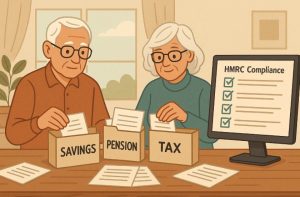
Pensioners can reduce the likelihood of receiving further notices by maintaining accurate and up-to-date records. Steps include:
- Regularly checking annual bank and savings statements.
- Reviewing tax codes at the start of each tax year.
- Updating HMRC promptly with changes in pension income.
- Keeping track of joint account interest and ensuring the correct split is applied.
- Considering professional tax advice if savings and pension arrangements are complex.
By staying informed and proactive, pensioners can avoid confusion and ensure their savings income is taxed fairly.
Conclusion
HMRC savings notices are designed to ensure that pensioners are paying the correct tax on their savings income.
While they can appear concerning, they often highlight small discrepancies that are easily resolved.
Understanding allowances, checking interest figures, and maintaining accurate records are the best ways for pensioners to stay compliant and avoid unexpected tax demands.
Frequently Asked Questions
What happens if a pensioner ignores an HMRC savings notice?
Failure to respond can result in penalties, further letters, and tax code adjustments.
Do pensioners always pay tax on bank interest?
Not always. Many pensioners fall within the Personal Savings Allowance or Starting Rate for Savings.
Can a pensioner reclaim tax if savings interest is below the allowance?
Yes. Pensioners can reclaim through Self Assessment or form R40 if tax was deducted in error.
How does HMRC know about savings interest?
Banks and building societies report interest payments directly to HMRC.
Are ISAs included in HMRC savings notices?
No. Individual Savings Accounts (ISAs) are tax-free and not counted towards allowances.
Does pension income reduce savings allowances?
Yes. Pension income counts towards overall income, which can reduce the starting rate for savings.
How often does HMRC update tax codes for savings?
Tax codes are reviewed annually but may change mid-year if new information is reported.

